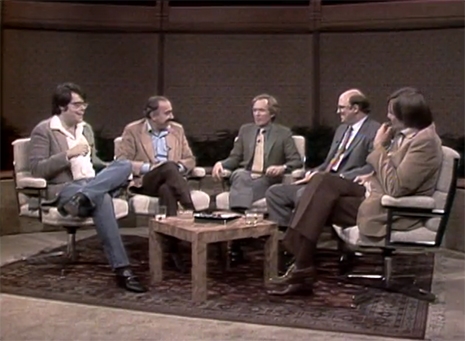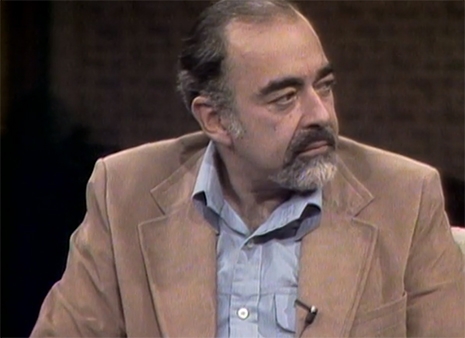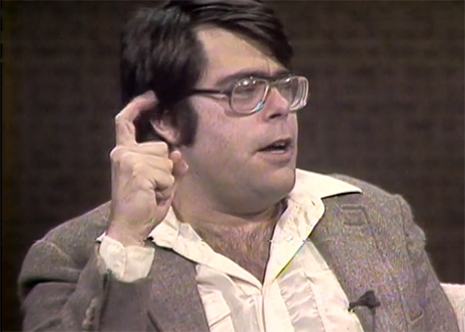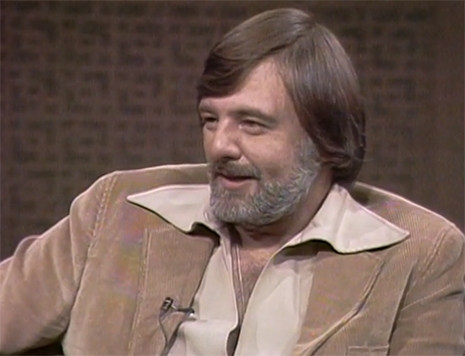
Shout Factory TV has given us an early Halloween treat by posting a thirty-five-year-old roundtable discussion from The Dick Cavett Show with Stephen King, George Romero, Ira Levin, and Peter Straub.
The discussion, in two parts, was originally broadcast on October 16 and 17 in 1980, shortly before Stephen King and George Romero began collaborative work on the film Creepshow.
King at that point was “the best-selling author in the world.” Romero’s greatest successes to that date were with Night of the Living Dead and Dawn of the Dead. Peter Straub’s major accomplishment up to that point was Ghost Story, which would be adapted into a motion picture the following year. Ira Levin represented the old guard on the panel, having written Rosemary’s Baby in 1967 and The Stepford Wives in 1972.

Ira Levin
The fascinating discussion takes place over two separate 30-minute programs. Personally, I could have watched another two hours of these guys talking about their work and inspirations. If you are a fan of any of these individuals, or the horror genre in general, the conversation is crucial.
The panel analyzes the appeal of horror, which Stephen King describes as a healthy way of exorcising the dark emotions of fear, aggressiveness, anger, and sadism in a harmless way. He calls it a way of “blowing off anxieties and bad feelings.” According to King, “You seek out the things that [as a child] scared you the most and you try to get rid of them.” Romero states that the success of horror is based on the ability to induce involuntary responses in the audience.

Stephen King
The panelists ultimately agree that story-telling is far more important than shock. “Scares don’t exist in a vacuum—you can’t scare someone without first telling them a story,” says King. They also agree that the horror medium is not amoral, in fact Romero asserts that “horror is traditionally highly moral.”
Cavett does a fine job of getting into what makes these terror craftsmen tick. King, who really steals the show for the entirety of the two programs, asserts that he doesn’t have bad dreams—he gives them “to somebody else.” Peter Straub, along that same line of thinking, states that the greatest compliment he can receive is someone telling him that they couldn’t sleep as a result of his work.

Peter Straub
When asked about what scared them as kids, Romero gives a wonderful insight into the mechanics of his own work, stating that there is a sociopolitical “underbelly” to his films because his greatest childhood fears were based around war, reading war comics, and the idea that the Russians had “the bomb.”
Cavett gets great answers when he asks about the authors that scared or influenced the panelists. Ira Levin cites Bram Stoker’s Dracula as the book that scared him the most, stating, “That is the masterpiece of the genre.” Romero cites H.G. Wells’ War of the Worlds as having a massive impact. King cites Ray Bradbury’s short story The Veldt as an influence on The Shining, and goes on to single out Richard Matheson as one of the greatest fright authors. Romero agrees and cites Matheson’s I Am Legend as a primary influence on Night of the Living Dead. The entire panel seems to agree on Lovecraft as one of the most important horror writers of all time.

George Romero
Perhaps my favorite “I didn’t know that” moment in the conversation comes from Ira Levin who reveals that William Castle (gimmicky shlock director of The Tingler, House on Haunted Hill, and Thirteen Ghosts) was almost the director of Rosemary’s Baby. Levin expresses his utter relief when Castle told him he was turning the film project over to Polasnski.
These programs are a reminder that it wasn’t really that long ago when you could not only see people smoking like chimneys on TV, but also see intelligent adult conversations without people yelling over each other. How novel. It’s funny that the excessive smoking of these writers really stands out in hindsight, but even Cavett calls the writers’ habit out, to which King retorts “I always tell my wife that anyone can quit smoking but it takes a real man to face lung cancer.”
Part one can be seen HERE, and Part two can be seen HERE. The two segments are part of an entire series of Dick Cavett “horror highlights” that Shout Factory TV is presenting this month.
Previously on Dangerous Minds:
Stephen King takes a stand against the class war in America
The bloody horror of Le Théâtre du Grand-Guignol